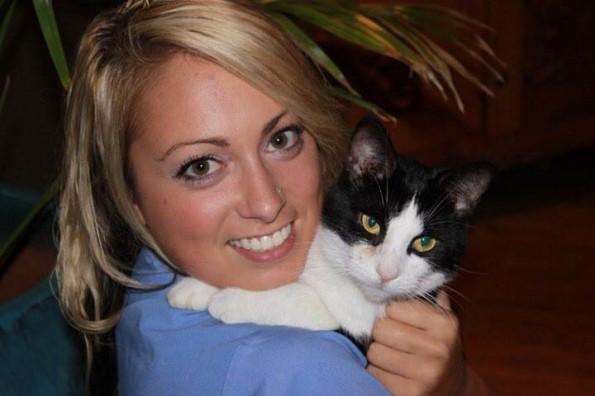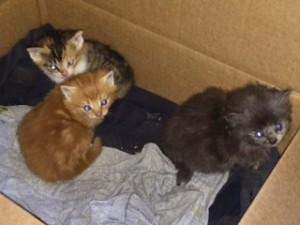
Feline upper respiratory tract infections are a frequent cause of sneezing in cats; often with goopy, green or blood-tinged snot and watery eyes. The cat may sound congested and cough or gag. An infected cat may have thick discharge from its eyes and have difficulty holding its eyes open. The parts of the body that are affected may include the eyes, nose, mouth, larynx/pharynx and trachea.
These infections are caused by contagious viruses, mostly commonly herpesvirus (also known as rhinotracheitis virus) or calicivirus. The cat may even be infected by multiple viruses. These viruses are transmitted by sick or carrier cats sneezing on healthy cats or sharing the same toys or food bowls. The viruses could also be transmitted on a person’s clothing. Once herpesvirus infects a cat it will have the virus for life and may have a reoccurrence of symptoms during times of stress. Humans cannot become infected by the majority of these viruses, which only spread from cat to cat.
Cats that are most likely to be infected are those that have a decreased immune system or high exposure. Cats with decreased immune systems include young kittens, geriatric cats and cats that are already ill or stressed. Cats are often stressed by changes in their household. Keep in mind that introducing a new cat into your home may cause an outbreak of upper respiratory tract infection. Outdoor cats, barn cats or cats in a shelter have a greater risk of exposure. Cat breeds with a flattened face (such as Himalayans) may be predisposed to infection as well.
Just a cold? Some cats may be able to fight the viral component of this infection on their own; however, in most cases, they develop secondary bacterial infections. Bacterial infections are best treated with appropriate antibiotics. If your cat develops a fever, stops eating or breathes with an open mouth, those are urgent concerns that should be assessed by a veterinarian the same day. If left untreated, a chronic upper respiratory infection may lead to dental problems such as gingivitis or pneumonia, which can cause death.
Treatment for upper respiratory tract infections may include:
- oral or injectable antibiotics
- eye ointment
- Lysine supplementation
- contains anti-viral properties for cats infected with herpesvirus
- anti-virals
- time in a steamy bathroom during your shower
- to aid with decongestion
Please do not give over-the-counter human medication to your cat without consulting a veterinarian
We recommend having your cat vaccinated preventively against feline herpesvirus and calicivirus with a core vaccine, known as FVRCP. This vaccine is generally given at eight weeks of age, then again as a booster at 12 weeks and 16 weeks. If a kitten has a severe infection that requires antibiotics, it may not be a good candidate for vaccination until it has been treated. A veterinarian can discuss a vaccination protocol that is right for your cat.
Mitchell Veterinary Services examines feline patients with upper respiratory infections frequently and fortunately, the majority of infections respond well to treatment.


